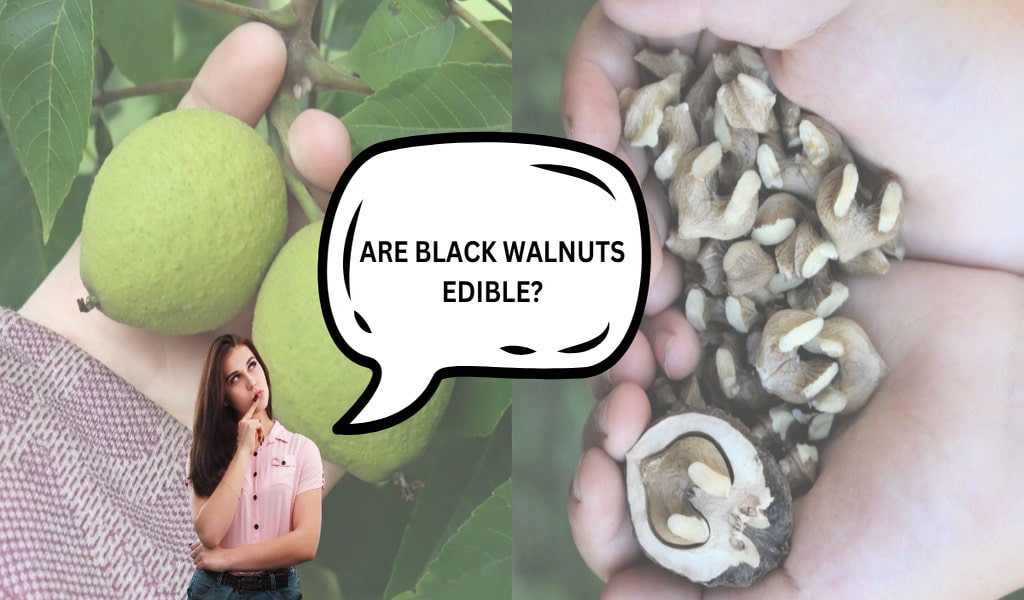
Are Black Walnuts Edible? How To Eat Black Walnuts
For centuries, walnuts have been valued for their rich nutritional content, especially protein, fiber, vitamins, and minerals. Recently, many people have discovered black walnuts and are curious about “are black walnuts edible” and how to store them. This article answers those questions in detail!
Before exploring further, please read the disclaimer located at the end of this webpage.
Key Takeaways
- You can eat black walnuts, but the shell and husk must be removed, and only the nut meat should be consumed.
- Ripe black walnuts have soft, yellow-brown shells and a faint, pleasant aroma.
- Up to a small handful of black walnuts daily is safe, roughly 30-60 grams [2].
Are Black Walnuts Edible?
The black walnut (scientific name: Juglans nigra) is a native North American tree, commonly found in the United States and part of the Juglandaceae family. While traditionally harvested for firewood, black walnuts have gained popularity as an edible nut, offering similar health benefits to standard walnuts.
The black walnut was first identified in 1629 in Northeastern America. It grows as a broad-leaf tree, reaching up to 130 feet (40 meters) in height with dark, ridged bark. Its nut is larger than the common walnut, with a hairy outer husk.
The leaves are oval, tapering at the tip, with serrated edges and soft hairs on the underside. Black walnuts ripen in the fall, and while their outer hull starts green with some brown, it turns fully brown as they mature.
Rich in essential nutrients such as protein, healthy fats, fiber, vitamin E, iron, and folic acid, black walnuts provide numerous health benefits, including:
- Support blood sugar stabilization
- Reduced risk of blood clotting
- Immune system support
- May regulate blood pressure
- Antioxidant and antibacterial properties
- Satiety benefits for weight management
- Improved gut health

How To Eat Black Walnuts
The edible part of black walnuts is located deep inside, surrounded by a hard shell that can be challenging to crack. The simplest way to eat black walnuts is to dry them thoroughly, making it easier to break open the shell. Once cracked, the nut inside has a mildly sweet taste and a light, pleasant aroma.
Another popular method is to roast or bake the walnuts. To do this, place the walnuts in a pan, add a pinch of salt, and roast until the shells are charred and fragrant. After cooling, break them open, extract the nut, and enjoy. You can eat them directly or add them to dishes like vegetable salads, pasta with tomato sauce, or even use them to make nut milk. Simply blend the nut pieces with milk or water, and enjoy the rich, creamy beverage each morning.
In addition, some supplement manufacturers recognize the health benefits of black walnuts and offer them as extracts in health products. You may want to explore reputable brands and consult a healthcare professional before using them.
Beside the fruit, black walnut leaves, although not directly editable, are still used as an ingredient in functional food products. Black walnut leaves contain an abundant source of juglone, a powerful antioxidant that maintains a clean and healthy intestinal environment, while also supporting immune function.
When Are Black Walnuts Ripe?
Only consume black walnuts once they’re fully ripe. Here’s how to identify a ripe walnut:
- The ideal harvest time is typically late August to early October.
- The outer hull should be a dark green color, soft to the touch, and slightly elastic.
- The nut inside should have a light color with a mild aroma.
- Ripe nuts may fall from the tree when you gently shake the branches.
- The shell should appear smooth and firm, without cracks.
Black Walnuts Harvesting Tips

Choose Appropriate Clothing And Wear Gloves
The juglone in black walnuts can irritate the skin and stain fingertips black. Before harvesting, wear protective clothing that covers most of your body (like long-sleeved shirts and pants), along with gloves, a hat, and sunglasses.
Gather Black Walnuts Promptly
Once you see the walnuts ripening, it’s best to harvest them promptly. Overripe walnuts can crack open, losing flavor and potentially developing compounds that may cause digestive discomfort, like bloating.
Remove The Husk Right Away
After harvesting, remove the walnut husks immediately to prevent stains from seeping into the nut, which could alter both its color and taste. To clean off the husk, remove the outer green layer and soak the nuts in clean water until the nut kernel’s white flesh is visible.
Let The Nuts Cure
Once husks are removed, sort the nuts by placing them in water. Only keep the nuts that sink, as these are fresh and edible, while those that float are likely undeveloped. Dry the nuts thoroughly in sunlight to eliminate any harmful bacteria before storing.
Store Black Walnuts In The Fridge Or Freezer
For nuts not used immediately, store them in the refrigerator or freezer. Black walnuts can be kept in the fridge for up to one year and in the freezer for up to two years or more. Store them in airtight containers or zip-lock bags to keep air out, and avoid placing them near strong-smelling foods like onions or raw meats.
Frequently Asked Questions
Can You Eat Black Walnuts Raw?
Yes, you can. However, only the nut meat is safe to eat—avoid the husk and outer shell. The juglone in the husk can irritate gums and tongue, and it may even increase the risk of cancer if ingested.
Are Black Walnuts Edible In The Wild?
Yes, they are. If you come across black walnuts in the wild that meet the ripeness criteria mentioned above, you can eat them. Just be sure to remove the shell thoroughly to ensure safety.
Are Black Walnuts Poisonous To Dogs?
Yes, they are. Black walnuts contain a compound called juglone, which can be toxic to dogs. Ingesting whole walnuts also poses choking hazards and risks of intestinal blockage. Signs of walnut toxicity in dogs include panting, vomiting, excessive drooling, and loss of appetite. If you notice these symptoms, take your dog to a vet immediately.
What Part Of The Black Walnut Is Edible?
Only the nut meat of the black walnut is edible. Ensure you remove the outer green husk for safe consumption. Wearing gloves when handling black walnuts is recommended to avoid staining from the husk’s juglone.
How Do You Know When Black Walnuts Are Ready To Eat?
You can tell if a black walnut is ripe by pressing on the husk. If it feels soft and can be indented with your finger, the walnut is likely ripe. Additionally, if the husk has turned from green to yellow-green or golden, the nut is ready for consumption.
Conclusion
We hope this article has answered your question, “Are black walnuts edible?” Overall, both black walnuts and regular walnuts offer significant health benefits when consumed properly and in appropriate daily amounts. In addition to eating fresh nuts directly, you can also incorporate essential nutrients from these nuts through supplements, provided they come in suitable dosages from trusted and reputable brands.
References
- [1] Mmichaud. (2021, November 8). Are my black walnuts safe to eat? - Cooperative Extension: Garden and Yard - University of Maine Cooperative Extension. Cooperative Extension: Garden and Yard; The University of Maine. https://extension.umaine.edu/gardening/2021/11/08/black-walnuts-safe-to-eat.
- [2] Petre, A. (2019, March 29). Black Walnuts: A Nutritious Nut Reviewed. Healthline; Healthline Media. https://www.healthline.com/nutrition/black-walnut.
Author

Product Disclaimer
Including an ingredient or study does not evaluate, endorse, or recommend any Vinatura product or any third-party product. Some ingredients discussed may not be used in any Vinatura product.
The content of the articles has not been evaluated by the Food and Drug Administration (FDA) and is not intended to promote or endorse any specific product. Any products sold on this website are not intended to diagnose, treat, cure, or prevent any disease.
Opinions and Endorsements
Any claims, statements, or opinions expressed in the articles are those of the author(s) and do not necessarily reflect the views or opinions of the manufacturers of the dietary supplement products. The products sold on this website are separate from the content of the articles and are not directly endorsed or associated with the information presented here.
Liability Disclaimer
The author(s) of the articles, website, and manufacturers of the dietary supplement products do not assume any liability for any potential consequences arising from the use of the information provided in the articles. Ingredient effects, dosages, and safety vary by individual, formulation, and context; some ingredients interact with medications or may be unsuitable during pregnancy or lactation. It is recommended that individuals consult with a qualified healthcare professional before making any dietary or lifestyle changes, including the use of dietary supplements.
Product Usage
Please refer to the product labels and packaging for specific usage instructions and guidelines for the dietary supplement products sold on this website.
Customer Support
For any concerns or questions regarding the dietary supplement products, please contact our customer support team, who will be more than happy to assist you.





Leave a Comment
Be the first to comment.
What do you think?